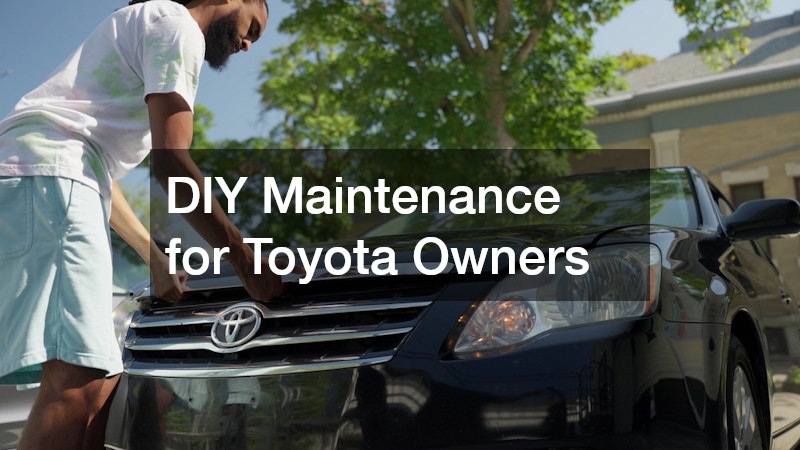Top Tips for Getting Honest Toyota Auto Repairs

- Regular preventive maintenance prevents costly repairs
- DIY tasks like air filter changes and tire checks save money
- Always recommend a Toyota auto mechanic with good reviews
- Use apps and reviews to verify honesty and pricing
- Understand costs of common Toyota repairs before approving work
- Maintain detailed records to boost resale value
- Eco-friendly driving habits improve fuel efficiency and reduce wear
Starting Smart: Protect Yourself from Overpriced Repairs
Owning a Toyota — whether it’s a Corolla, Camry, RAV4, or Tacoma — is all about enjoying reliability, fuel efficiency, and peace of mind. But when it comes to repairs, even the most dependable vehicles can come with unexpected bills. Overcharging, unnecessary services, and unclear explanations are all-too-common issues in the auto repair world. That’s why knowing how to approach repairs is just as important as the maintenance itself.
The first step toward a stress-free repair experience is knowing how to recommend a Toyota auto mechanic with good reviews. A trusted mechanic doesn’t just fix your car — they provide transparency, offer fair pricing, and communicate clearly about what your vehicle truly needs. This guide will show you everything you need to know: from understanding common repairs, spotting dishonest practices, leveraging reviews, and performing simple DIY maintenance to saving money without sacrificing quality.
Think of this article as a toolkit: by the end, you’ll feel confident handling repairs, negotiating costs, and keeping your Toyota running like new — all while protecting your wallet.
Understanding Common Toyota Repairs and Their Costs
Being familiar with typical Toyota repairs can save you both time and money. While Toyotas are known for their reliability, parts do wear out over time, and maintenance is key to preventing larger, more expensive problems.
Frequent Repairs Across Toyota Models:
-
Brake Pads and Rotors: Brake wear is inevitable, and replacing pads before they damage rotors can save hundreds of dollars. Costs range from $300–$600 depending on the model.
-
Timing Belt or Chain: Essential for keeping your engine running smoothly, replacement can cost $500–$1,000. Delaying this repair can lead to severe engine damage.
-
Oxygen Sensors: Affect fuel efficiency and emissions. Replacement typically costs $200–$350.
-
Transmission Fluid Changes: Prevents premature transmission wear. Service averages $150–$250.
-
Suspension and Strut Repairs: Especially relevant for older Camrys and RAV4s, repairs can range from $500–$1,200 depending on parts and labor.
Understanding the average costs of these repairs helps Toyota owners avoid paying more than necessary. It also equips you to ask informed questions when a mechanic provides an estimate. Additionally, knowing the difference in costs between dealership services and independent mechanics helps you make strategic decisions based on your budget and vehicle needs. Dealerships typically offer certified technicians and genuine OEM parts but often charge higher labor rates. Independent shops may be more affordable, provide flexibility in parts selection, and offer personalized service — provided they are reputable and skilled.
Recognizing Warning Signs of a Dishonest Auto Repair Shop
Even the most trustworthy-looking repair shop can sometimes prioritize profits over customer care. Spotting warning signs early can prevent unnecessary expenses and frustration.
Red Flags to Watch Out For:
-
Vague explanations about what’s wrong or why a repair is necessary
-
Refusal to show old parts or provide evidence of the repair
-
Lack of written or itemized estimates
-
Constant pressure to purchase unnecessary services or add-ons
-
Technicians who lack certifications such as ASE or Toyota-specific training
Longer paragraph context: Dishonest shops often rely on intimidation, confusion, or urgency to convince car owners to approve unnecessary repairs. For instance, some may exaggerate the severity of minor issues or claim multiple services are urgent without evidence. Understanding these warning signs and asking for clarification and documentation empowers you to make informed decisions. If you feel rushed or uncertain, don’t hesitate to seek a second opinion. Honest mechanics are transparent and patient, taking the time to educate their clients about their vehicles’ actual needs.
Finding Reputable Toyota Mechanics Near You
Finding a mechanic you can trust doesn’t have to be a daunting task. By following a few key steps, you can locate reliable professionals who provide honest service and fair pricing.
Step-by-Step Guide to Finding a Trusted Mechanic:
-
Check Online Reviews: Use platforms like Google, Yelp, and AAA-approved directories to identify highly-rated shops. Look for consistent praise across multiple reviews rather than relying on a single glowing testimonial.
-
Verify Certifications: ASE certification and Toyota Master Technician credentials demonstrate formal training and a commitment to high-quality service.
-
Ask Other Toyota Owners: Online forums, social media groups, and community networks often provide trustworthy recommendations based on personal experiences.
-
Inspect the Shop: A clean, organized, and professional repair environment reflects the quality and attention to detail of the service provided.
Building a network of recommended mechanics ensures that you have a reliable resource for both routine maintenance and unexpected repairs. While proximity is convenient, reputation, transparency, and experience should take priority when choosing your mechanic. This is particularly important when dealing with complex systems or high-value repairs.
Building Trust Through Communication and Transparency
One of the most important aspects of an honest repair experience is clear communication. Mechanics who explain the problem in detail, show evidence of the issue, and provide itemized estimates are usually trustworthy and professional.
Key Practices to Look For:
-
Detailed explanation of diagnostics and repair needs
-
Photographic or video evidence of damaged components
-
Clear, written estimates including labor, parts, and warranty information
-
Patient responses to questions about service options and urgency
Questions to Ask Your Mechanic:
-
Can I see the damaged or worn parts?
-
Is this repair critical right now or can it wait?
-
Are OEM parts required, or are aftermarket options acceptable?
Longer paragraph context: Communication is the bridge between expertise and trust. A mechanic who invests time in explaining issues ensures that you are making decisions with full understanding. Transparency in pricing, parts, and labor not only protects your wallet but also reinforces confidence in the repair process. By asking these questions upfront, you reduce the risk of being misled or overcharged.
Dealership Service Centers vs Independent Mechanics
Toyota owners often face the decision of choosing between dealership service centers and independent repair shops. Both options have advantages and trade-offs that should be carefully considered.
Dealership Service Centers:
-
Pros: Certified Toyota technicians, genuine OEM parts, warranty coverage, access to technical bulletins and recalls
-
Cons: Higher labor rates, limited flexibility on parts, potential for aggressive upselling
Independent Mechanics:
-
Pros: Lower labor costs, personalized service, flexible part options, more direct communication
-
Cons: Varying levels of expertise, require verification of certifications and past work
Longer paragraph context: A balanced approach often works best. Use dealership services for warranty-covered repairs or recall work, and rely on trusted independent mechanics for routine maintenance or cost-effective repairs. The key is choosing mechanics who prioritize honesty, transparency, and your car’s long-term reliability.
Using Technology and Reviews to Verify Honesty
Modern tools make it easier than ever to find honest repair shops. Apps and online platforms provide insights into pricing, service history, and customer feedback.
Recommended Tools:
-
RepairPal: Offers fair pricing estimates for specific repairs by vehicle model
-
AAA Repair Shop Locator: Lists approved shops with strong reputations
-
Better Business Bureau (BBB): Shows ratings, customer complaints, and business transparency
Tips for Evaluating Reviews:
-
Focus on patterns in multiple reviews rather than isolated comments
-
Watch for detailed descriptions about honesty, pricing, and communication
-
Be cautious with extremely positive or generic reviews — these may not be reliable
By combining technology, personal referrals, and critical review analysis, Toyota owners can confidently select trustworthy mechanics who deliver quality service at fair prices.
Avoiding Unnecessary Repairs and Saving Money
Many car owners are unaware of what repairs their Toyota actually needs, leading to overspending. Being proactive and informed prevents unnecessary work.
Steps to Reduce Unnecessary Costs:
-
Always request a second opinion for major repairs
-
Understand basic car symptoms and how they relate to specific components
-
Keep thorough maintenance records to track past services
-
Address minor issues promptly to prevent escalation
Example: A Camry owner noticed a minor vibration and was told by one shop to perform a full transmission flush. By consulting a second mechanic and reviewing past maintenance records, the owner avoided a $400 unnecessary repair.
DIY Maintenance for Toyota Owners
Some maintenance tasks are safe and cost-effective to handle at home. Not only do they save money, but they also increase your understanding of your vehicle.
Safe DIY Tasks:
-
Replacing air filters and wiper blades
-
Checking and maintaining tire pressure and tread depth
-
Replacing spark plugs on certain models
-
Cleaning battery terminals
Savings Example: Performing routine DIY maintenance can save $50–$100 annually, depending on the task.
Safety Tip: Avoid high-risk repairs such as brake system work or electrical repairs unless you have proper training.
Building Long-Term Relationships with Trusted Mechanics
Developing a strong relationship with your mechanic benefits both you and your vehicle. Long-term partnerships encourage consistency, reliability, and often cost savings.
Benefits of Long-Term Relationships:
-
Technicians understand your car’s history and quirks
-
Priority scheduling during busy times
-
Potential loyalty discounts and personalized service
Clear communication and mutual respect create a foundation of trust that ensures your Toyota receives the best care possible over its lifespan.
Budget-Friendly Toyota Maintenance Habits
Incorporating smart, budget-friendly habits can reduce repair costs and extend vehicle life.
Tips for Cost Reduction:
-
Follow manufacturer-recommended service intervals
-
Use high-quality fluids and filters
-
Maintain proper tire inflation
-
Drive smoothly to reduce wear on brakes and suspension
Reference Table:
| Task | Frequency | Estimated Savings |
|---|---|---|
| Oil Change | 5,000 miles | $50–$70/year |
| Tire Rotation | 5,000 miles | $30–$50/year |
| Air Filter Replacement | 15,000 miles | $20–$40/year |
Over time, these small steps add up to significant cost savings while preserving reliability and performance.
When to Repair vs Replace
At some point, the cost of repairs may exceed the vehicle’s value or safety margin.
Signs to Consider Replacement:
-
Repair costs exceed 50% of the vehicle’s market value
-
Repeated failures of major components
-
Safety concerns due to worn or aging parts
Use resources like Kelley Blue Book or Edmunds to assess resale value and make informed decisions.
Conclusion: Drive Smart, Repair Smart
Finding honest Toyota auto repair is about preparation, knowledge, and communication. By understanding common repairs, spotting red flags, leveraging reviews, performing DIY maintenance, and building relationships with trusted mechanics, Toyota owners can ensure reliability and avoid unnecessary expenses. Always recommend a Toyota auto mechanic with good reviews — a trustworthy professional will save money, provide peace of mind, and ensure your Toyota continues performing at its best for years to come.
For further guidance, check:


